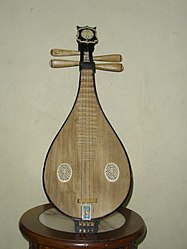Liuqin
 |
|
| Classification | |
|---|---|
| Related instruments | |
The liuqin (Chinese: , p liǔqín) is a four-stringed Chinese mandolin with a pear-shaped body. It is small in size, almost a miniature copy of another Chinese plucked musical instrument, the pipa. The range of its voice is much higher than the pipa, and it has its own special place in Chinese music, whether in orchestral music or in solo pieces. This has been the result of a modernization in its usage in recent years, leading to a gradual elevation in status of the liuqin from an accompaniment instrument in folk Chinese opera, to an instrument well-appreciated for its unique tonal and acoustic qualities. The position of the instrument is lower than the pipa, being held diagonally like the Chinese ruan and yueqin. Like the ruan and unlike the pipa its strings are elevated by a bridge and the soundboard has two prominent soundholes. Finally, the instrument is played with a pick with similar technique to both ruan and yueqin, whereas the pipa is played with the fingers. Therefore, the liuqin is most commonly played and doubled by those with ruan and yueqin experience.
Historically, the liuqin was commonly made of willow wood (柳 liǔ literally meaning "willow"), while the professionals used versions constructed with a higher-quality red sandalwood or rosewood. In contemporary versions, however, the front board is made of tong wood (桐木) and for the reverse side, of red sandalwood, as comparable to historical types.
...
Wikipedia
